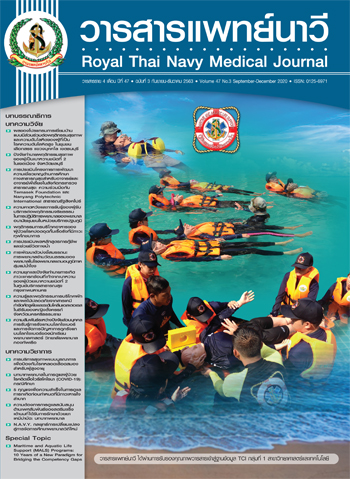Role of Nurses in Caring for Coronavirus (COVID-19) Patients: A Case Study
Main Article Content
Abstract
Coronavirus disease 2019 (COVID-19) is a dangerous pandemic disease that easily spreads and severely emerging throughout the world. It widely resulted in physical and psychological difficulties especially the latter which led to tremendous fear and anxiety in the general population, infected group, suspected group, family members of infected patients, and including healthcare professionals. All reactions occurred because of various causes such as insufficient knowledge and understanding regarding Coronavirus (COVID-19), incorrect actions, inability to adjust into an ongoing problem, and inadequate knowledge and understanding of personal psychological management. Nurses are health care professionals who play pivotal roles in providing care to patients to serve their needs in both physical and psychological dimensions. This article presents details concerning Coronavirus (COVID-19); nursing care and role of nurses in caring for Coronavirus (COVID-19) patients and a case study in the isolation unit.
Article Details

This work is licensed under a Creative Commons Attribution-NonCommercial-NoDerivatives 4.0 International License.
References
World Health Organization. Q & A on coronaviruses (COVID-19). [Internet]. [cited 2020 July 25]. Available from: https://www.who.int/emergencies/diseases/novel-coronavirus-2019/
question-and-answers-hub/q-a-detail/q-a-coronaviruses.
Zhang J, Wu W, Zhao X, Zhang W. Recommended psychological crisis intervention response to the 2019 novel coronavirus pneumonia outbreak in China: a model of West China Hospital. Precis Clin Med 2020;3(1):3-8.
World Health Organization. Coronavirus disease 2019 (COVID-19) situation report-160. [Internet]. [cited 2020 July 25 ]. Available from: https://www.who.int/docs/default- source/coronaviruse/situation-reports/20200628-covid-19-sitrep-160.pdf?sfvrsn=2fe1c658.
Centers for Disease Control and Prevention. Coronavirus disease 2019 (COVID-19). [Internet]. [cited 2020 July 25]. Available from: https://www.cdc.gov/coronavirus/
ncov/symtomstesting/symtoms.html.
Department of Disease Control. Coronavirus disease (COVID-19). [Internet]. [cited 2020 July 25]. Available from: https://ddc.moph.go.th/viralpneumonia/eng/ind knowledge.php. (in Thai).
Sukhatungka K. Stress and stress relief. Bangkok: Faculty of Medicine Siriraj Hospital; 2545. (in Thai).
Struart GW, Sundeen SJ. Principle and practice of psychiatric nursing. 5th ed. ST Louis: Mosby; 1995.
Leuboonthawatchai O, Leuboonthawatchai P. Psychosocial treatment for depressive. Bangkok: Chulalongkorn University Printing House; 2553. (in Thai).
BBC NEWS. World Bank concerned about public health promotion and prevention service if COVID-19 stays long. [Internet]. [cited 2020 September 4]. Available from: https://www.bbc.com/thai/thailand-52728635. (in Thai).
Department of Medical Sciences. Laboratory examination guideline for diagnosis of COVID-19 disease. [Internet]. [cited 2020 July 25]. Available from: https://www3.dmsc.moph.go.th/
post-view/700. (in Thai).
Ministry of Higher Education, Science, Research and Innovation. Practice guidelines, diagnosis, care and infection prevention in the hospital with COVID-19 diseases revised version. [Internet]. [cited 2020 July 25]. Available from: http://covid19.dms.go.th/
backend///Content/Content_FIle/Bandner(Big)/Attach/2560501105024AM CPG%20COVID
%20@%200200%20am%20%201may%202020%20 ns.pdf.
World Health Organization. Coronavirus disease 2019 (COVID-19). [Internet]. [cited 2020 July 1]. Available from: https://www.who.int/news-room/detail/04-07-2020-who-discontinues-hydroxychloroquine-and-lopinavir-ritonavir-treatment-arms-for-covid-19.
Department of Disease Control. Criteria, characteristics, and guidelines for managing quarantine area for travelers returning from high risk areas. [Internet]. [cited 2020 July 25]. Available from: https://ddc.moph.go.th/viralpneumonia/file/gother/Gother012.pdf. (in Thai).
Department of Medical Service. Guidelines for care COVID-19 diseases. [Internet]. [cited 2020 July 25]. Available from: http://covid19.dms.go.th/Content/Select_Content_ GridHome78?contentcategoryId=8. (in Thai).
Department of Disease Control. Tips of personal equipment using for infection prevent Version. [Internet]. [cited 2020 July 25]. Available from: https://ddc.moph.go.th/
viralpneumonia/file/g_health_care/g07_ppe.pdf). (in Thai).
The Thai Society of Critical Care Medicine. Clinical management of severe case COVID-19 disease. [Internet]. [cited 2020 July 25]. Available from: http://r8way.moph.go.th/
r8wayadmin/page/uploads_file/20200401104854_6%20TSCCM%20 guidelines%20on%
severe%20COVID-19%20MARCH%2022%202020.pdf. (in Thai).
Kathleen M, Stacy KM. Pulmonary disorder. In: Urden LD, Stacy KM, Lough ME, editors. Critical care nursing: diagnosis and management. Canada: Elsevier; 2018. p. 456-68.
Piyapakornchai P. Nursing care of patients receiving oxygen and ventilator therapy. Bangkok: Tana Press; 2553. p. 106-8. (in Thai).
Duvall AC, Tumsen T. Therapeutic communication skills for nurses. Journal of The Royal Thai Army Nurses 2018;19(Supplement September-December):25-33. (in Thai).
Pichai I. Taking care of patient during the Coronavirus outbreak: a guide for psychiatrists. [Internet]. [cited 2020 March 30]. Available from: https://www.cstsonline.org/assets/media/.
International Federation of Red Cross and Red Crescent Societies (IFRC). Mental health and psychosocial support for staff, volunteers and communities in an outbreak of Novel Coronavirus. Hong Kong: IFRC; 2020.
Kusoom W. Critical care nursing: a holistic approach. 6th ed. Bangkok: Sahaprachapanich; 2017. (in Thai).
Schumacher L. Chernecky C. Nursing survival guide: critical care and emergency nursing. 2nd ed. Center for the Study of Traumatic Stress: Saunders Elsevier; 2010. p. 164-282.
Precha T. Prone position in patients with respiratory distress syndrome. In: Monthira M, Rawiwan L, Surut T, Natthaphon R, editors. Internal medicine 2018. Bangkok: Printable; 2018. p. 123-33. (in Thai).


